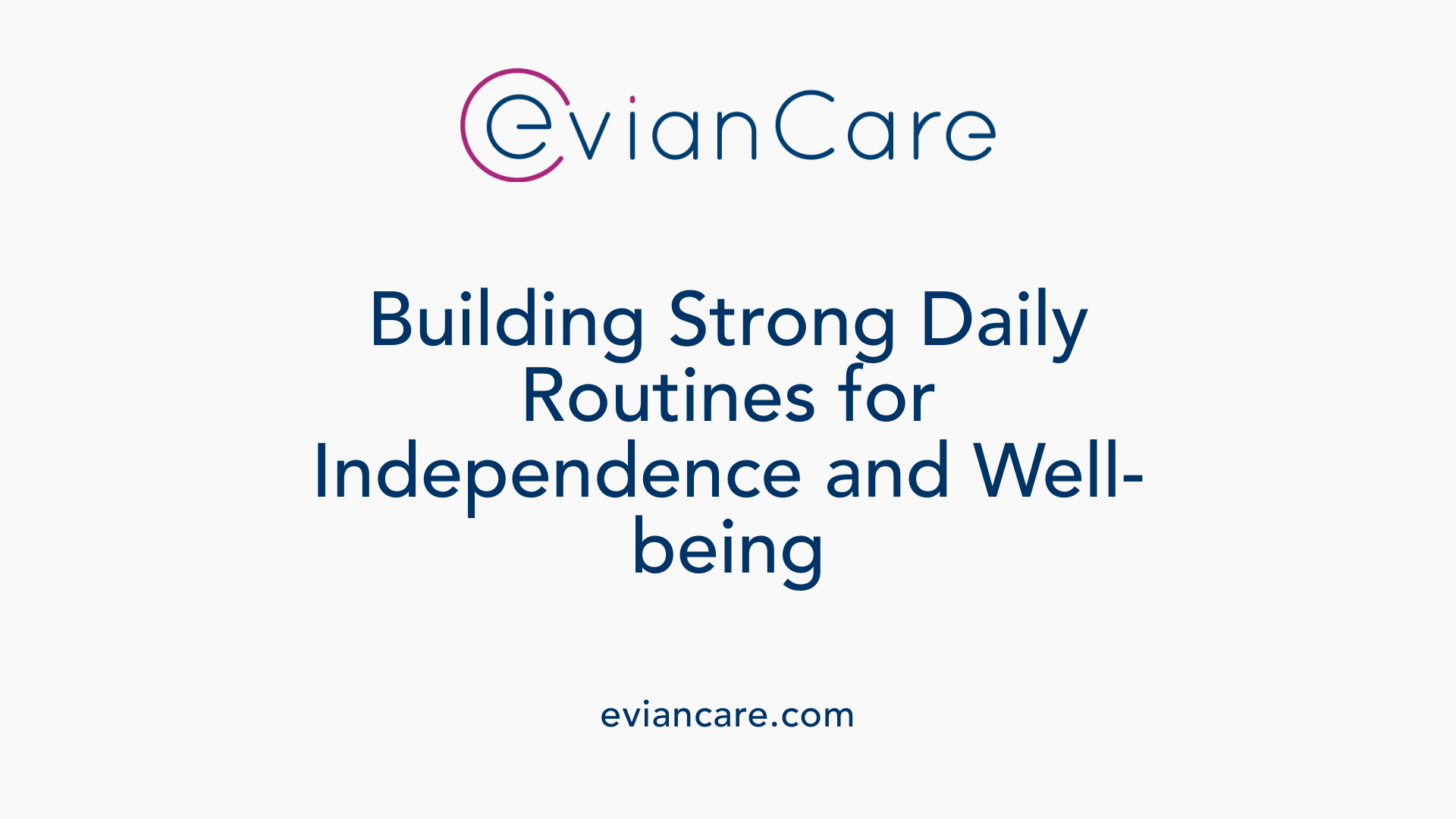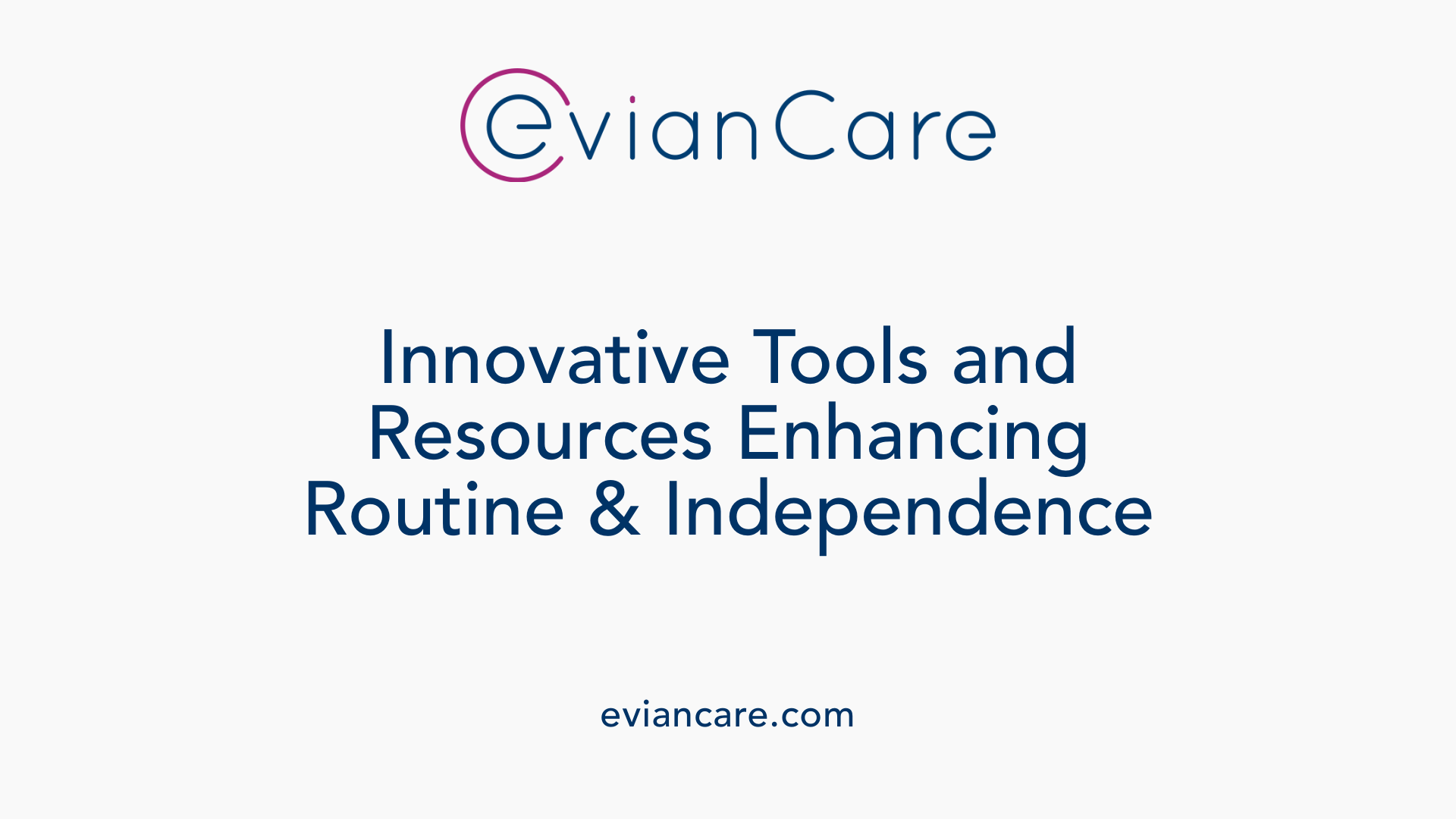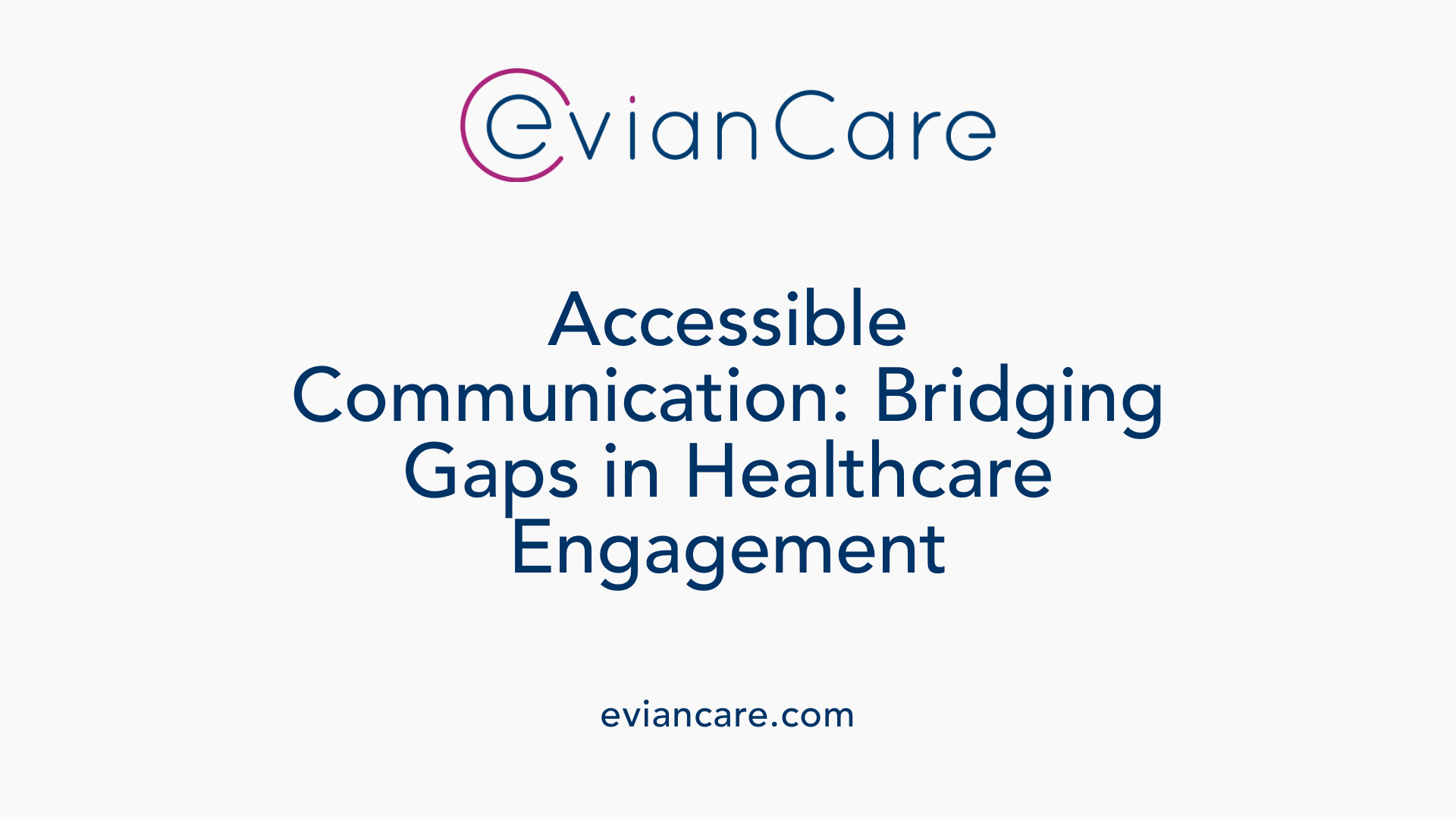
Understanding the Importance of Routine Appointments for Adults with Disabilities
Establishing and maintaining routine healthcare and support appointments are vital for adults with disabilities. Regular routines foster stability, independence, and emotional well-being while ensuring health needs are proactively managed. Given the multiple challenges faced by this population, tailored strategies, accessible resources, and supportive environments are essential to bridge gaps and promote comprehensive health care engagement.
The Significance of Routines in Supporting Mental and Emotional Well-being
Why are routines important for the mental health, independence, and emotional well-being of adults with disabilities?
Routines play a vital role in the lives of adults with disabilities. They create a predictable environment, which helps reduce feelings of anxiety, stress, and overwhelm that often accompany unpredictable daily changes.
Consistent activities—such as personal care, meal prep, and recreational tasks—offer stability. This stability supports emotional regulation by providing a framework within which individuals can feel safe and secure.
Setting up structured routines also promotes independence. When adults know what to expect and how to carry out daily tasks, they gain confidence in their abilities to manage their lives, making them more self-sufficient.
Moreover, routines help maintain important biological rhythms, like sleep patterns, and assist in managing ongoing health conditions. This contributes to overall improved well-being.
During times of disruption—such as health crises, environmental changes, or travel—re-establishing routines quickly can restore emotional balance. It offers reassurance and a sense of control, helping adults with disabilities navigate challenges more effectively.
In essence, routines underpin emotional stability, support independence, and elevate mental health, forming a foundation for thriving despite the challenges associated with disabilities.
Creating and Sustaining Effective Daily Routines

How can adults with disabilities develop independent living skills related to managing appointments?
Developing the ability to manage appointments independently is a vital aspect of fostering autonomy for adults with disabilities. A personalized and person-centered approach is essential, which means tailoring routines and strategies to each individual's unique needs, preferences, and abilities.
Support strategies involve breaking down the process of scheduling and attending appointments into small, manageable steps. For example, using visual cues like checklists or pictorial schedules helps individuals understand what to do next and remember upcoming tasks.
Incorporating visual tools such as calendars, electronic reminders, or accessible communication devices enhances independence. These tools provide consistent prompts and reduce reliance on others, helping adults prepare for and attend appointments more confidently.
Reinforcement is crucial; positive feedback and encouragement motivate ongoing effort and build confidence in managing routine healthcare activities. Regular practice, ideally integrated into daily routines, supports skill retention and mastery.
Collaboration with support staff, caregivers, and the individuals themselves allows for ongoing adjustment of strategies to address emerging challenges or changing needs. Support personnel can also assist in setting realistic goals and providing emotional encouragement.
Community resources, adaptive technologies, and skill-building programs further support long-term independence. Participation in workshops or training sessions focused on life skills, along with assistive devices, empowers adults to handle health-related appointments with minimal assistance.
In summary, creating routines that encompass planning, preparation, and follow-up—utilizing visual and technological aids, along with consistent reinforcement—helps adults with disabilities develop essential skills for managing appointments independently. This fosters a sense of control and confidence, supporting their overall independence and well-being.
| Step | Example Tools/Strategies | Purpose |
|---|---|---|
| Breaking down tasks | Pictorial checklists, step-by-step guides | Simplifies complex processes, enhances understanding |
| Using visual supports | Calendars, reminders, visual schedules | Aids memory, promotes planning |
| Employing adaptive technologies | Phone alarms, apps, accessible devices | Provides consistent prompts, easy access to information |
| Reinforcing skills | Positive feedback, rewards | Builds confidence, encourages routine practice |
| Collaborating with support | Regular review meetings, goal adjustments | Ensures strategies remain effective and relevant |
By fostering structured routines and utilizing tailored supports, adults with disabilities can gain the skills necessary for independent appointment management, ultimately enhancing their quality of life and sense of autonomy.
Resources and Technology Supporting Routine Management
 Adults with disabilities benefit from a variety of resources and innovative tools designed to help them manage daily routines and appointments more effectively. Digital tools and applications are increasingly popular, offering features like scheduling, reminders, and visual organization. For example, calendar apps with visual cues or digital planners tailored for individuals with learning disabilities can significantly improve organization and independent planning.
Adults with disabilities benefit from a variety of resources and innovative tools designed to help them manage daily routines and appointments more effectively. Digital tools and applications are increasingly popular, offering features like scheduling, reminders, and visual organization. For example, calendar apps with visual cues or digital planners tailored for individuals with learning disabilities can significantly improve organization and independent planning.
Adaptive devices and aids also play a crucial role. Mobility aids, such as wheelchairs and walkers, facilitate physical independence, while communication devices like speech-generating devices or picture boards enable effective expression and participation during medical visits or daily activities. Environmental adjustments like accessible bathroom fixtures, visual cue systems, and adaptive kitchen tools help promote safety and autonomy at home.
Support from professionals, including occupational therapists, is vital for developing personalized routines and recommending suitable assistive technologies. Community programs dedicated to self-sufficiency and social inclusion provide additional support, offering training, peer support, and resources to reinforce routine development.
Furthermore, organizations specializing in disability services often implement comprehensive models that focus on proactive care, long-term planning, and building trust within the community. These initiatives help individuals with disabilities adopt structured routines, reduce anxiety, and enhance their overall independence.
The integration of these tools, devices, and professional services forms a robust framework that empowers adults with disabilities to live more independently, participate fully in their healthcare, and enjoy improved quality of life.
Effective Communication and Accessibility in Healthcare Settings

How can communication methods and accommodations facilitate appointment adherence for adults with disabilities?
Effective communication strategies and accommodations are vital to helping adults with disabilities attend and benefit from healthcare appointments consistently. When healthcare providers utilize tools such as sign language interpreters, augmentative and alternative communication devices, visual aids, and captioning, they bridge gaps that might otherwise hinder understanding. These innovations ensure that patients comprehend their health information and feel comfortable expressing concerns.
In addition, making accommodations like sensory-friendly environments, quiet rooms, and assistive listening devices addresses specific sensory or auditory sensitivities. Such measures create a welcoming space that reduces stress and distractions, encouraging patients to stay engaged and adhere to scheduled appointments.
Proactively documenting individual communication preferences and needs within electronic health records helps streamline care. When staff know a patient's preferred methods of communication, they can prepare accordingly and provide consistent support across visits.
Training healthcare staff on ADA compliance, respectful and effective communication, and proper use of accommodations fosters a more inclusive environment. This education not only reduces unintended barriers but also promotes a culture of understanding.
Furthermore, accessible telemedicine platforms and well-designed physical facilities support ongoing healthcare engagement. These technological and structural adaptations allow adults with disabilities to access care conveniently and without undue barriers. Overall, tailored communication methods and thoughtful accommodations significantly increase appointment adherence, contributing to better health outcomes and equitable care for adults with disabilities.
Overcoming Barriers to Routine Healthcare Access

What are common barriers and challenges faced by adults with disabilities in attending routine appointments, and how can they be overcome?
Adults with disabilities often encounter several obstacles that hinder their ability to access healthcare consistently and effectively. These include transportation difficulties, inaccessible facilities and equipment, provider attitudes, communication challenges, sensory sensitivities, and systemic issues within healthcare systems.
Transportation difficulties are a prevalent barrier, especially in areas lacking reliable, wheelchair-accessible transit options. To address this, communities can enhance transportation services tailored for individuals with disabilities, coordinate medical transport programs, and encourage healthcare providers to offer telehealth options where appropriate.
Inaccessible healthcare facilities and equipment further impede access. Many clinics lack ramps, adjustable examination tables, or wheelchair-friendly spaces. Recommendations include enforcing compliance with the Americans with Disabilities Act (ADA), training staff on proper transfer techniques, and investing in adaptable medical equipment like adjustable-height tables and accessible scales.
Provider attitudes and systemic barriers also play a significant role. Some healthcare professionals lack training on disability accommodations, leading to discomfort, biases, or unintentional neglect. Improving provider education on disability rights and communication techniques, alongside policies promoting inclusive practice, can make a positive difference.
Communication challenges and sensory sensitivities may cause anxiety or misunderstandings during medical visits. Use of visual aids, written instructions, and alternative communication methods like picture boards or speech devices can facilitate better understanding. Additionally, scheduling appointments at quieter times and creating a sensory-friendly environment can reduce stress.
Systemic issues such as poor care coordination, fragmented services, and low health literacy further complicate access. Developing integrated care models, providing caregiver training, and ensuring clear, accessible health information are essential strategies.
Although telehealth offers promising solutions by reducing physical barriers, obstacles like lack of digital literacy, inaccessible devices, and inadequate broadband limit its reach. Expanding accessible telehealth platforms and providing technical support can bridge this gap.
Efforts to eliminate these barriers involve collaborative strategies: training healthcare professionals, upgrading facilities, implementing inclusive policies, and supporting individuals with disabilities through tailored programs. These measures help promote equitable healthcare access, ensuring adults with disabilities can receive routine care that meets their needs and respects their dignity.
The Role of Occupational Therapy and Support Services in Establishing Routines
What role do occupational therapy and support services play in helping adults with disabilities establish effective routines?
Occupational therapy and comprehensive support services are essential in guiding adults with disabilities towards building effective daily routines. They begin with detailed assessments to understand each individual’s unique strengths, challenges, and personal goals. This initial step helps identify specific needs related to independence in daily activities, mobility, and social engagement.
Based on these insights, therapists develop personalized intervention plans that are flexible and holistic. These plans often include strategies such as breaking down complex tasks into manageable steps, practicing skills through repetition, and incorporating activities like cooking, arts, or household chores. Such activities are tailored to fit into the individual’s routines, fostering a sense of accomplishment and continuity.
A significant part of this process involves the use of adaptive equipment and environmental modifications. Assistive tools like grab bars, adaptive utensils, or visual cues help enhance independence and safety. Environmental changes, such as rearranging furniture for easier mobility or reducing clutter, further support smooth daily functioning.
Addressing emotional regulation and sensory processing challenges is also crucial. Therapists teach skills for managing stress, adapting to sensory inputs, and coping with behavioral difficulties, which strengthens resilience and consistency in routines.
Overall, occupational therapy and support services empower adults with disabilities to develop sustainable routines. These routines improve not only practical skills but also emotional well-being, enabling individuals to participate more fully in their communities, maintain independence, and enjoy a better quality of life.
Legal, Ethical, and Support Frameworks for Routine Appointment Management
What are the legal considerations and healthcare support roles involved in establishing and maintaining routine appointments for adults with disabilities?
Ensuring that adults with disabilities can access routine healthcare appointments involves navigating a complex landscape of legal and ethical considerations. Laws such as the Americans with Disabilities Act (ADA) set important standards for accessible healthcare services and facilities, requiring providers to make modifications that accommodate various disabilities. This includes accessible exam rooms, special equipment, and appropriate transfer techniques.
Legal rights also include understanding and supporting informed consent. Adults with disabilities have the right to participate in decisions affecting their health, which may involve supported decision-making frameworks if they face challenges understanding or expressing preferences. Guardianship arrangements or formal support agreements may be needed to safeguard their autonomy while assuring their healthcare needs are met.
Support roles in managing routine appointments are often provided by healthcare professionals such as physicians, nurses, and support workers. These teams help with care coordination, ensuring appointments are scheduled at suitable times, and that transportation logistics are addressed. Support workers and advocates assist in communicating needs, explaining procedures, and ensuring the individual’s preferences are respected.
Accessibility and competence of healthcare facilities are crucial. Staff training on disability accommodations, use of assistive equipment, and communication strategies help create an inclusive environment. Legal considerations also encompass long-term planning, including eligibility for Medicaid or other funding mechanisms that cover healthcare costs.
Overall, a multidisciplinary approach that combines legal awareness, patient advocacy, and healthcare coordination ensures adults with disabilities can maintain regular, effective access to healthcare services. This approach fosters independence and sustains quality of life, respecting individual rights and promoting equitable treatment.
The Impact of Neuroaffirming Care and Tailored Strategies

What is neuroaffirming care, and how can tailored support strategies improve healthcare experiences for neurodiverse adults?
Neuroaffirming care is a compassionate approach that recognizes and celebrates the natural diversity of neurological functioning. Instead of viewing conditions such as Autism, ADHD, or Dyslexia as disorders needing cure, this approach respects them as variations in human neurodevelopment. It emphasizes acceptance, affirmation of identity, and personalized support tailored to each individual’s unique needs.
Creating inclusive healthcare environments is a cornerstone of neuroaffirming care. Such settings are sensory-friendly and accessible, reducing overwhelming stimuli and providing accommodations like quiet rooms, visual aids, or flexible appointment scheduling. These adaptations foster a sense of safety and trust, encouraging neurodiverse adults to engage more openly.
Tailored support strategies enhance the quality of healthcare by addressing specific challenges faced by neurodiverse individuals. For example, using visual communication tools and providing clear, simple explanations help improve understanding. Flexibility in therapy methods, such as combining traditional or alternative approaches, allows for better participation.
Developing self-advocacy skills is also part of this approach, empowering individuals to express their needs confidently. This not only promotes independence but also ensures their preferences are respected during care.
By challenging negative stereotypes and reducing systemic barriers, neuroaffirming care supports a more respectful and effective healthcare experience. It encourages engagement, builds trust, and ensures that neurodiverse adults receive equitable treatment aligned with their strengths and preferences.
In summary, neuroaffirming care integrates personalized strategies and inclusivity practices, creating a healthcare experience where neurodiverse adults feel valued, understood, and supported—ultimately leading to better health outcomes and enhanced well-being.
Building a Supportive Framework for Routine Healthcare
Supporting adults with disabilities in establishing and maintaining routine appointments requires a comprehensive, person-centered approach. This includes leveraging assistive technologies, creating accessible environments, employing effective communication strategies, and providing targeted support from healthcare professionals like occupational therapists. Legally and ethically, ensuring accommodations, respecting autonomy, and fostering collaboration with support networks are essential. Promoting routines that are flexible yet consistent not only enhances health management but also contributes significantly to emotional stability, independence, and overall quality of life. With continued commitment and resource integration, healthcare systems can become more inclusive and responsive, empowering adults with disabilities to lead healthier, more autonomous lives.
References
- Helping Adults with Intellectual Disabilities Prepare for Medical and ...
- Empowered Caregivers: Practical Guides & Emotional Support
- The Power of Routines: 4 Ways Establishing Consistency Supports ...
- Intellectual Disability Self-Care & Independent Living Skills
- Equitable Care for Patients With Disabilities
- The Power of Routine: How Occupational Therapy Helps Adults ...
- 5 Important Daily Living Skills to Have | Adults With Disabilities
- [PDF] Scheduling an Appointment | Healthy Transitions
- Supporting adults with intellectual and developmental disabilities to ...
- Why is structure important for someone with a learning disability?












